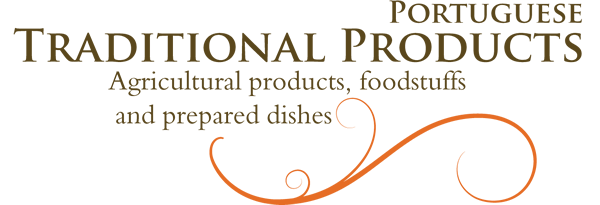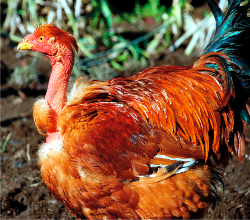Description: Capão de Freamunde PGI is the product of all breeds of slow-growth varieties of the Atlantic Gallus domesticus which is castrated before reaching sexual maturity and which is exclusively intended for the production of quality meat, raised from very young in the geographical area delineated. According to the product specification can be used the typically Portuguese breeds, existing in the north of Portugal, in particular the breeds Portuguese Pedrês, Lusitanian Black and Yellow. Capão de Freamunde PGI is put up for sale as follows: live, duly identified, in the form of carcases, properly packaged and labelled, plucked and legs and head off, but packaged with the liver and gizzards and in the form of frozen carcases.
Production method: The plant species used in the feed of the Capão de Freamunde PGI and which form the basis of its feed are native to the region. They are corn as well as the Holcus mollis, Lolium multiflorum and Plantago lanceolata L varieties of graminoids and broad-leaved weeds. Once they are five weeks old, the animals have continuous access during the day to open areas covered by vegetation. After castration, between 3 and 4 months of age, until the slaughter or sale of the live animal, the feed administered at will must contain at least 80 % yellow or white corn, whether ground or whole, and the remainder may include waste baking flour, cow cabbage, wild vegetation and cereal seed.
Special features: The Capão de Freamunde PGI is produced exclusively from slow-growth varieties and breeds, which are carefully castrated and reared free-range, with a diet based largely on natural grasslands, supplemented with cereals, mainly with corn. Their carcases can be clearly distinguished by their greater weight, more intense colouring, broad breast with abundant muscle tissue, and their thin, smooth and hydrated skin. The carcases can also be clearly distinguished from common birds after cooking, as they have a moderately tender texture, are slightly doughy and very juicy.
Production area: The Capão de Freamunde PGI production area is limited to the Municipality of Paços de Ferreira, and part of the Municipalities of Lousada and Paredes.
History: The Capão de Freamunde PGI is the signature dish of the parish of Freamunde. The custom of castrating young cocks in order to make them plumper and more docile has long been practised in the parish and its surrounding area. It is a well-known fact that the custom of castrating birds and selling them is very old and, since the Middle Ages, was customary in the parish known as ‘Salvadori de Friamunde’. The Freamunde Capon Fair is well-known even today and attracts many tourists. This fair, which was already being held in the 15th century, falls on the same day as the Catholic feast of Saint Lucia, patron saint of the blind. The ‘Capão de Freamunde’ is traditionally consumed in the winter and sets the standard for the eating habits of the production area, peaking during the Christmas season. It is also offered as a gift at Christmas, which attests to the important symbolic value of this product to the people of the region.
Product specification (pdf)
Producer group
Associação de Criadores de Capão de Freamunde
Control and certification body
Kiwa Sativa – Unipessoal, Lda.
Control plan
Control plan (pdf)
Publication in EU official journal
Regulamento (CE) nº 1107/96 da Comissão – L130/1 28.05.2015
Publicação do Documento Único – C2/3 7.1.2015
Publication in the Portuguese official journal
Aviso nº 4881/2007 – 15.03.2007
Aviso nº 4950/2011 – 18.02.2011



